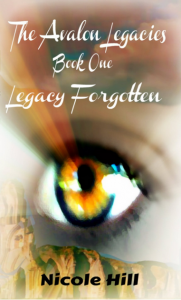2013
Aug
01
How Nicole Hill's Legacy Forgotten Made Me Rethink Storytelling
I've put off writing this review because I knew it would be the hardest I've ever written.
And here's why. I was attracted to the story through the author's tweets on Twitter. My favorite:
Haven't read Legacy Forgotten cause Twilight ruined Vamps for ya? Kenneth will beat the shit out Edward's sparkly ass!
Sounded clever, which led me to speculate that she might have written some other clever lines. Naturally, I took a look at the reviews on Amazon, but I came away with a surprise. Reviews ranged from two stars ("Another indie Pub grammar nightmare!") to five ("Holy Crap! ... I loved the book!"). What made this review difficult, and what led me to rethink storytelling in general, is that both assessments are true and I didn't know how to approach it.
 You need to know that I can be positively anal about grammar, spelling, and punctuation. I agonize over whether a gerund or participial phrase would better serve a purpose. If I post an article and later find an error in it, I fix it and then writhe in humiliation for an hour. I have proofread works well over 20 times to comb any technical flaws from them, and still they leak through. I don't know how professional editors do it.
You need to know that I can be positively anal about grammar, spelling, and punctuation. I agonize over whether a gerund or participial phrase would better serve a purpose. If I post an article and later find an error in it, I fix it and then writhe in humiliation for an hour. I have proofread works well over 20 times to comb any technical flaws from them, and still they leak through. I don't know how professional editors do it.
Yes, Legacy forgotten is full of editing oversights, but with my attitude about grammar now publicly exposed, allow me to say to those who reject the book because it's an "indie pub nightmare": quit your whinin'! It's a damned imaginative and compelling story. Naturally, I began the novel noticing every jot and tittle. For a while, I made notes of them thinking I might correct them for free because the story deserves to be read. But I soon gave up on that idea and let myself enjoy what I was reading, and slid warmly into the plot.
Those of us with any western heritage at all have some familiarity with Arthurian legend. Likewise, vampires have intrigued us for hundreds of years, as have witches. If you have never heard of Camelot, of Dracula, of the Wicked Witch of the East, you simply need to crawl back into whatever cave you have been living in and forsake any ambition of integrating with the civilized world. What Hill does, creatively, is to integrate those three traditions into a compelling and coherent narrative. You never thought they'd go together, did you? The overarching story concept is dazzling.
And she does this through believable characters who are also original. Kenneth is a vampire, but not like any you've ever seen. Ailis is a homicide detective, but not like any you've ever seen. Her grandmother is ... well ... like no one you've ever seen. And King Arthur.... No, I won't go there. That would be giving too much away. Once these characters start interacting, the action and surprises never stop. If the story has a fault at all, it's that sometimes things come a bit too fast, leaving the reader trying to catch his breath as he tries to catch up.
And all this is how I came to rethink storytelling. Throughout the majority of human history, stories were passed from generation to generation verbally, or so say the anthropologists. It was a fairly recent development that stories were put to paper, and far more recently that we got picky about the placement of commas and whether a gerund or participle is more appropriate. And even then, we can't make up our collective mind for very long at a time about what is the correct way to do something.
Regardless, the important part is to tell the story. All the rules about grammar and spelling and punctuation are just trappings on the road to telling that story. It takes a colossal fool to deprive himself of such a creative work as Legacy Forgotten because the wrapper doesn't agree with what someone said it should look like.
Of the self-published books I've read so far, only one (Thaddeus White's Journey to Altmortis) got by me without my finding any errors in it (note that a gerundial phrase is more appropriate here). As a self-publisher myself, I know how hard it is to excise them all, and it was only White's example that convinced me it's even possible. I'm starting to wonder if a few hundred years of "professional" publishing might have spoiled us in a sense and caused us to take for granted an unreasonable and largely unattainable level of perfection, like the über-rich who who refuse to ride in a car until the ashtray is spotless or who rejects a $5000 wedding cake because one of the roses is off-center. We've become so worried about the thread-count of the lace that we don't even consider if it's a suitable garment to wear.
Legacy Forgotten is quite suitable.
I can't say that this realization has broken me of being anal about detail in my own works, but it has taught me to be less critical and to focus on what is really important. Even with all the "errors," Legacy Forgotten is very readable, and very worth reading. I fully intend to enjoy the rest the series, because it starts out so well that it obliges me to find out how it ends.
I'll leave you with another of the author's tweets, which is also accurate:
Wanna watch an action movie? Read Legacy Forgotten instead.















Comments
by Nicole Hill on 2013 Aug 02
Thank You so much Duane for this review. I am still working on getting the editing perfect and am learning new things everyday. Either, I will be able to afford an editor soon or I won't need one because I finally figured it out. Either way, I'm excited to finish telling the story of this great family and how they finally fix their mistakes.
by Fredösphere on 2014 May 08
I've been thinking the same thing. Publishing houses get the copy editing consistently right because they can. Consistently finding great stories? Not so much. Story telling is hard; a great story should be treasured, no matter what the packaging.
by Richard on 2015 Aug 03
I do think it's a bit much to reject a wedding cake for an off-center rose. But if you're charging $5000 for a wedding cake, that's what can happen! What's the actual value of the cake? I am genuinely curious about that, without wanting to draw any corollaries. I completely agree that we lose sight of the wood for the trees sometimes, and the telling of the STORY is very important. "Literary" literature doesn't focus on plot. I feel plot's FAR more important than WRITING. I've read any number of literary books where I tell people "It's great" and then they say "What's it about?" and I'm like "Ehhhh..."
by Tiffee Jasso on 2015 Aug 17
I have been wondering when grammar police would lighten up and realize story telling is an art, and not English 101.
by Nicole Hill on 2013 Aug 02
Thank You so much Duane for this review. I am still working on getting the editing perfect and am learning new things everyday. Either, I will be able to afford an editor soon or I won't need one because I finally figured it out. Either way, I'm excited to finish telling the story of this great family and how they finally fix their mistakes.
by Fredösphere on 2014 May 08
I've been thinking the same thing. Publishing houses get the copy editing consistently right because they can. Consistently finding great stories? Not so much. Story telling is hard; a great story should be treasured, no matter what the packaging.
by Richard on 2015 Aug 03
I do think it's a bit much to reject a wedding cake for an off-center rose. But if you're charging $5000 for a wedding cake, that's what can happen! What's the actual value of the cake? I am genuinely curious about that, without wanting to draw any corollaries. I completely agree that we lose sight of the wood for the trees sometimes, and the telling of the STORY is very important. "Literary" literature doesn't focus on plot. I feel plot's FAR more important than WRITING. I've read any number of literary books where I tell people "It's great" and then they say "What's it about?" and I'm like "Ehhhh..."
by Tiffee Jasso on 2015 Aug 17
I have been wondering when grammar police would lighten up and realize story telling is an art, and not English 101.
You must be logged in to post a comment.